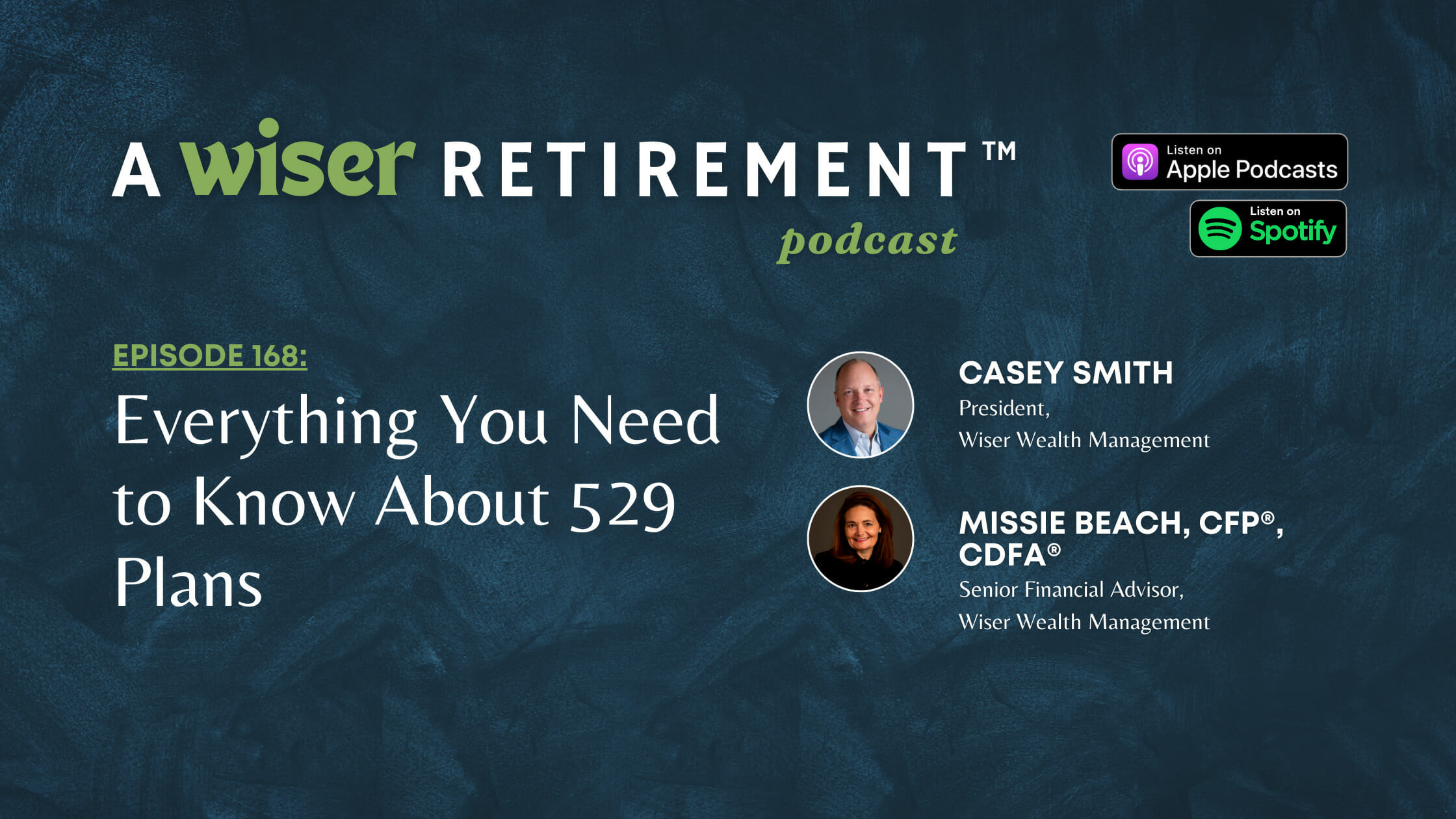
Everything You Need to Know About 529 Plans
On this episode of A Wiser Retirement™ Podcast, Casey Smith and Missie Beach, CFP®, CDFA® discuss 529 plans as a vehicle for college savings.
Listen on Apple Podcasts or watch on YouTube:
SUMMARY:
There’s a lot you need to know about 529 plans, and on top of that they are constantly changing. So, if you learned everything about it 3 years ago, there’s more you need to learn now. A 529 plan is a vehicle for college savings. It’s a way to put away money for education and let it grow tax-free. From a legacy standpoint, once you have reached a point in your life when you have money to spare, you can use those extra dollars to fund education for the next generation. We should always keep in mind that a comfortable and worry-free retirement starts with education. Nonetheless, education expenses increase on average by 6.5% per year. So, 529 plans are here to help ensure your children and grandchildren will have access to good education.
Maybe you don’t feel ready to start putting money away to pay for your children’s college tuition yet. Maybe, you still have a newborn baby or a toddler at home, and it’s hard to project your family to such a faraway future. However, putting a few thousand dollars on a 529 account upfront when your kids are little, and then even $25 a month, can make a big difference in the future. That is only possible because of compound interest. On the other hand, compound interest will not be so helpful if you wait to create a 529 plan when your child is in high school.
Tax Advantages
A 529 plan offers many advantages, one of them being tax related. In GA you can contribute up to $8,000 per beneficiary and get a state deduction, which would be 6% of that. This varies by state and not all states offer this benefit.
Types of 529 Plans
There are two main types of 529 plans. The traditional is where you put money in the account, and that money will be available for your child when they start college to spend on school expenses. This allows them to choose any college or university in the country. The second type is a prepaid 529 plan. In this plan, you save money for tuition payment to a determined college or university. This plan does not exist in GA. However, it is very common in Florida.
Student Owned vs. Parent Owned
When choosing a 529 plan you can choose who will own the account. You may want to be the custodial owner, which means you only own it until your child is 18. This gives the child full rights to the account at age 18. The other way, which is the most commonly chosen by parents and grandparents is keeping the account under your name and choosing your children as beneficiaries.
The key is how it is treated on the FAFSA form. Schools will make you fill out the FAFSA even for merit aid. If the 529 plan is student-owned it counts 20% towards your ability to pay for tuition. If it’s a parent-owned plan it only counts 5.64%. So, there’s an advantage to leaving it as a parent-owned account.
Investment Options
This part of the plan could be described just as a 401k plan. You can set it and forget it, by choosing the age-based investment option. The age-based option is a glide path from risky to very conservative. It starts off with stocks when children are young. Then it transitions to treasuries as they are getting ready to go to college. It is important to consider that a 529 plan is not an investment to be aggressive and take risks with.
Contribution Limits
A 529 plan is considered a gift. So, if you are the owner and the child’s the beneficiary of the plan you can invest up to the annual gift tax exemption without following or without filing a gift tax form. You could also front-load it, which is what a lot of grandparents do if they’re trying to whittle down the value of their estate. The 529 plan varies by state, and in terms of lifetime contribution limits it varies as well. In some states, it may be $500,000, and for others, it could be $250,000. It depends on each particular plan and how much they will allow the account owner to contribute. The account size can grow beyond that but in terms of contribution money put into the plan, there is typically a limit.
What To Do If Your Child Ends Up Not Using the Money
What if your child doesn’t go to college? Or maybe goes to college on a full scholarship? The funds on the account can be moved to a family member, maybe a friend, or even yourself if you decide to further your education. However, we mostly see families passing it down to younger kids in the family, in the case when there’s an unused balance from the older kids.
Eligible Expenses for 529 Accounts
Eligible expenses are considered tuition books, fees, supplies, and school laptop. One thing many people ask about is travel. Unfortunately, travel is not considered a 529 plan expense. However, you can also cover housing and meals. Even if a student lives off-campus in an apartment the school will publish what the typical housing cost is for a student living on campus and you can withdraw the amount that’s equivalent to an on-campus living situation for your off-campus student. There’s a myriad of expenses that qualify.
Roll a 529 Plan into a Roth IRA
Another provision that’s come out is the ability to roll over unused 529 funds to a Roth IRA. For your 529 plan to be eligible you have to have the account open for at least 15 years, and the maximum you can roll over is $35,000 and only up to that year’s contribution limit. The Roth account would be for the beneficiary and not the owner.
When it comes down to the 529 plan, it is a great legacy planning for grandparents and also for young families. It is a great way to save on taxes, and also to hedge your expenses with your child’s education, since they can get very big in the future.
Download our eBook on “Buyer Beware: Why do they keep trying to sell you that annuity?”
TIMESTAMPS:
0:00 Intro
03:28 Tax Advantages
04:18 Types of 529 Plans
05:25 Student Owned vs. Parent Owned
08:20 Investment Options
09:55 Contribution Limits
11:30 What To Do if Your Child Ends Up Not Using the Money
12:48 Eligible Expenses for 529 Accounts
16:30 Roll a 529 Plan into a Roth IRA
LINKS:
Learn more about Casey Smith and Missie Beach, CFP®, CDFA®
CONNECT:
Twitter, Instagram, Facebook, LinkedIn, and YouTube.
Learn more about A Wiser Retirement™ podcast and access previous episodes.
Share This Story, Choose Your Platform!
Wiser Wealth Management, Inc (“Wiser Wealth”) is a registered investment adviser with the U.S. Securities and Exchange Commission (SEC). As a registered investment adviser, Wiser Wealth and its employees are subject to various rules, filings, and requirements. You can visit the SEC’s website here to obtain further information on our firm or investment adviser’s registration.
Wiser Wealth’s website provides general information regarding our business along with access to additional investment related information, various financial calculators, and external / third party links. Material presented on this website is believed to be from reliable sources and is meant for informational purposes only. Wiser Wealth does not endorse or accept responsibility for the content of any third-party website and is not affiliated with any third-party website or social media page. Wiser Wealth does not expressly or implicitly adopt or endorse any of the expressions, opinions or content posted by third party websites or on social media pages. While Wiser Wealth uses reasonable efforts to obtain information from sources it believes to be reliable, we make no representation that the information or opinions contained in our publications are accurate, reliable, or complete.
To the extent that you utilize any financial calculators or links in our website, you acknowledge and understand that the information provided to you should not be construed as personal investment advice from Wiser Wealth or any of its investment professionals. Advice provided by Wiser Wealth is given only within the context of our contractual agreement with the client. Wiser Wealth does not offer legal, accounting or tax advice. Consult your own attorney, accountant, and other professionals for these services.





